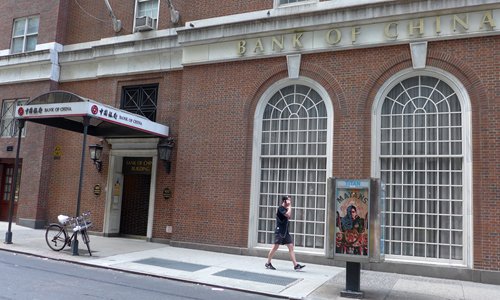
A passenger walks past a Bank of China branch in New York. File photo: VCG
US crude oil benchmark West Texas Intermediate (WTI) has unexpectedly pushed the Bank of China (BOC) into controversy as investors of the bank's crude oil futures product found themselves owing a sum of money after being asked to settle the product at -$37.63 per barrel.
The product, crude oil "bao" or treasure, is sold by the bank to individual customers in the Chinese mainland. The product is linked to foreign crude oil futures contracts, including the WTI. It was launched in January 2018 and was not permitted leverage trading.
The US WTI futures contract due to expire on Tuesday (US time) has fallen into negative territory for the first time, now at -$37.63 a barrel.
BOC announced on Wednesday that individual domestic investors would have to settle in line with that price, while new trading of crude oil "bao" would be suspended from the same day.
That shocked many investors as the announcement meant they had not only lost their own money but owed money to BOC. The incident led investors to vent their anger online, fueling questions of loopholes in the bank's futures product.
An investor who bought contracts worth 2 million yuan ($282,362) said he had lost a total of over 6 million yuan, of which 4 million yuan is owed to the bank, domestic news site thepaper.cn reported.
However, given big fluctuations in crude oil prices, market analysts said the crude oil "bao" should be classified as high-risk products though they are sold together with wealth investment products at the bank.
Although investors of crude oil products issued by ICBC and China Construction Bank (CCB) also reported losses, they were not as serious as those of BOC's investors, and they did not owe the bank money. Some investors therefore said BOC had not fulfilled its risk control obligations according to the principle of prudence, media reports said.
In the wake of the incident, several domestic banks including CCB and Bank of Communications halted new futures contract trading.
